
Still Fighting for Equal Rights
After winning the right to vote in 1920, suffragists continued their fight for equality. In 1923,
the National Woman’s Party and Alice Paul, along with lawyers Sue White and Crystal Eastman,
drafted and introduced to Congress the Equal Rights Amendment (ERA). The ERA, another
constitutional amendment, would guarantee women equal rights under the law and prohibit
discrimination based on sex.
the National Woman’s Party and Alice Paul, along with lawyers Sue White and Crystal Eastman,
drafted and introduced to Congress the Equal Rights Amendment (ERA). The ERA, another
constitutional amendment, would guarantee women equal rights under the law and prohibit
discrimination based on sex.

Still Fighting for Equal Rights
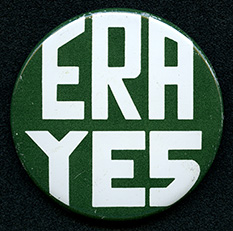
An activist button worn by Equal Rights
Amendment (ERA) supporters.
Amendment (ERA) supporters.
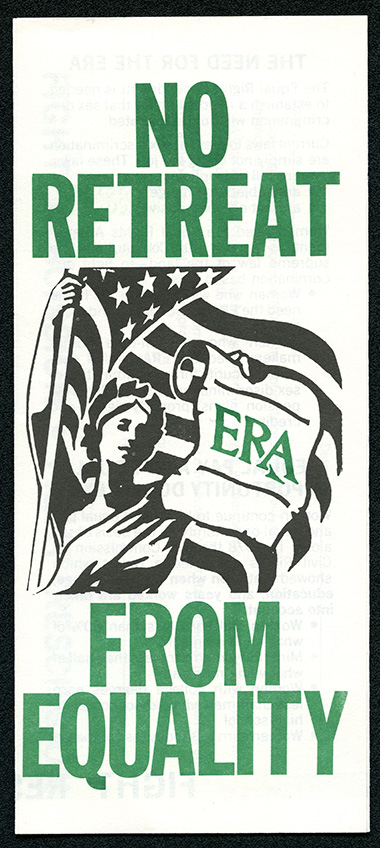
No retreat from equality, after 1979
Women's, Gender, and Sexuality Studies Program records,
UA 63, Box 23, Folder 2
Description
Women's, Gender, and Sexuality Studies Program records,
UA 63, Box 23, Folder 2
Description
An informational pamphlet advocating for
the support and passage of the ERA.
the support and passage of the ERA.

Still Fighting for Equal Rights
Internationally acclaimed aviator Amelia Earhart joined members of the National
Woman’s Party in 1932 to petition President Hoover to support the Equal Rights
Amendment, also called the Lucretia Mott Amendment. Earhart frequently spoke out
in support of equal rights for women, stating, "Why can't we regard work according
to the individual's natural aptitudes, not as to whether the work is 'woman's work'
or 'man's work'?" Earhart brought this belief with her to Purdue when she joined
as a faculty advisor and women’s career counsellor from 1935 until her disappearance
in 1937.
Woman’s Party in 1932 to petition President Hoover to support the Equal Rights
Amendment, also called the Lucretia Mott Amendment. Earhart frequently spoke out
in support of equal rights for women, stating, "Why can't we regard work according
to the individual's natural aptitudes, not as to whether the work is 'woman's work'
or 'man's work'?" Earhart brought this belief with her to Purdue when she joined
as a faculty advisor and women’s career counsellor from 1935 until her disappearance
in 1937.

Still Fighting for Equal Rights

"Equal Rights," volume 24, number 2, January 15, 1938
George Palmer Putnam collection of Amelia Earhart papers, MSP 9, Box 8
Description | Digital Image
George Palmer Putnam collection of Amelia Earhart papers, MSP 9, Box 8
Description | Digital Image
In 1938, the Equal Rights Committee of the
National Woman’s Party established a permanent
fund for its support. The fund was to be named
for a member, “who in her own life had
exemplified the principle of equal rights.”
The committee unanimously chose Amelia Earhart,
who throughout her life advocated for equal
rights between men and women.
National Woman’s Party established a permanent
fund for its support. The fund was to be named
for a member, “who in her own life had
exemplified the principle of equal rights.”
The committee unanimously chose Amelia Earhart,
who throughout her life advocated for equal
rights between men and women.

Still Fighting for Equal Rights

"Equal Rights," volume 18, number 25, October 1, 1932
George Palmer Putnam collection of Amelia Earhart papers,
MSP 9, Box 25, Scrapbook 13
Description | Digital Image
George Palmer Putnam collection of Amelia Earhart papers,
MSP 9, Box 25, Scrapbook 13
Description | Digital Image
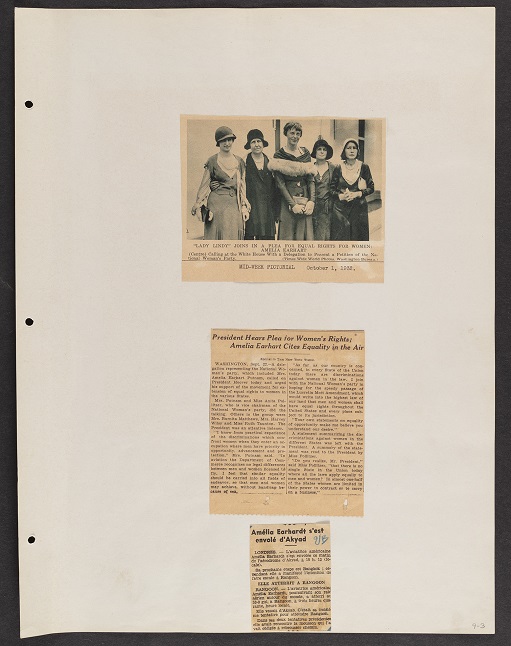
Various newspaper clippings, October 1, 1933
George Palmer Putnam collection of Amelia Earhart papers,
MSP 9, Box 23, Scrapbook 9
Description | Digital Image
George Palmer Putnam collection of Amelia Earhart papers,
MSP 9, Box 23, Scrapbook 9
Description | Digital Image
Two pages from Amelia Earhart’s scrapbooks containing a newsletter and newspaper clippings
depicting Earhart, Anna Kelton Wiley, and other National Woman’s Party members who petitioned
President Hoover to support the Equal Rights Amendment.
depicting Earhart, Anna Kelton Wiley, and other National Woman’s Party members who petitioned
President Hoover to support the Equal Rights Amendment.

Still Fighting for Equal Rights
The ERA was introduced into Congress every year until, forty-nine years later in 1972,
Congress finally passed the ERA and sent it to states for ratification.
The League of Women Voters began a nationwide pressure campaign supporting the
amendment. They networked with other pro-ERA organizations in the United States,
distributed free informational publications to unratified states, and developed a
nationwide plan to organize support.
These actions relied on the work of local and state chapters. The Indiana League and
Greater Lafayette League helped disseminate information, lobbied local and state politicians,
and created ERA resources that provided information directly relevant to state legislation.
Congress finally passed the ERA and sent it to states for ratification.
The League of Women Voters began a nationwide pressure campaign supporting the
amendment. They networked with other pro-ERA organizations in the United States,
distributed free informational publications to unratified states, and developed a
nationwide plan to organize support.
These actions relied on the work of local and state chapters. The Indiana League and
Greater Lafayette League helped disseminate information, lobbied local and state politicians,
and created ERA resources that provided information directly relevant to state legislation.

Still Fighting for Equal Rights

"Discover the E.R.A.", December 1975
Women's, Gender, and Sexuality Studies Program records,
UA 63, Box 23, Folder 2
Description
Women's, Gender, and Sexuality Studies Program records,
UA 63, Box 23, Folder 2
Description
An educational booklet produced by the
League of Women Voters.
League of Women Voters.
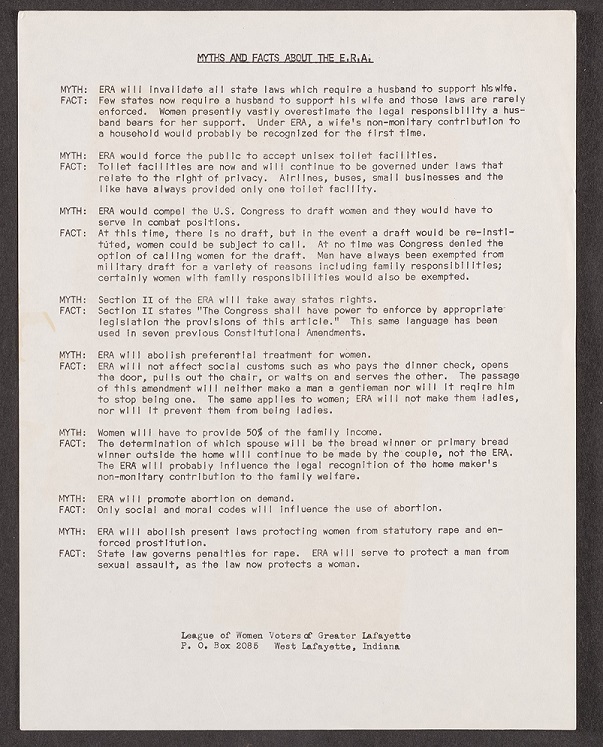
"Myths and facts about the E.R.A.", undated
League of Women Voters of Greater Lafayette records,
MSP 55, Box 17, Folder 8
Description
League of Women Voters of Greater Lafayette records,
MSP 55, Box 17, Folder 8
Description
A fact sheet produced by the League of
Women Voters of Greater Lafayette to dispel
myths and misinformation about the ERA.
Women Voters of Greater Lafayette to dispel
myths and misinformation about the ERA.

Still Fighting for Equal Rights

"ERA the Hoosier Way" pamphlet, 1970s
League of Women Voters of Greater Lafayette records,
MSP 55, Box 17, Folders 7
Description
League of Women Voters of Greater Lafayette records,
MSP 55, Box 17, Folders 7
Description
A pamphlet about the ERA produced by the
organization Hoosiers for the ERA (HERA).
organization Hoosiers for the ERA (HERA).
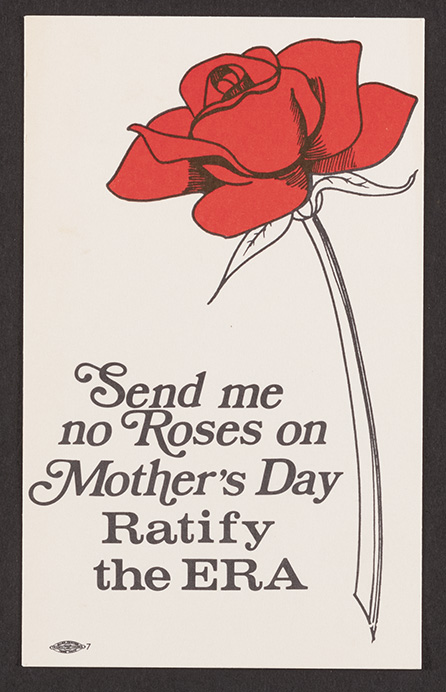
"Send me no roses on Mother's Day" card, undated
League of Women Voters of Greater Lafayette records,
MSP 55, Box 17, Folder 8
Description
League of Women Voters of Greater Lafayette records,
MSP 55, Box 17, Folder 8
Description
A card requesting the ratification of the
ERA in lieu of roses on Mother’s Day.
ERA in lieu of roses on Mother’s Day.

Still Fighting for Equal Rights
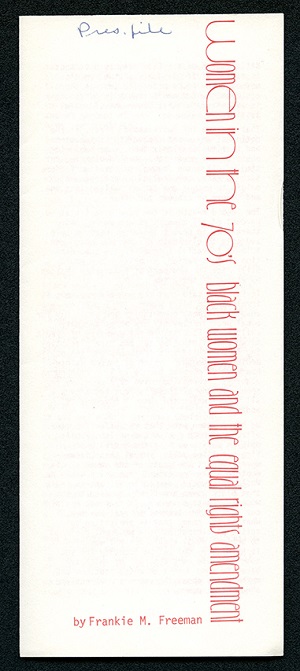
"Women in the 70's" pamphlet, 1970s
League of Women Voters of Greater Lafayette records, MSP 55, Box 17, Folders 7
Description
League of Women Voters of Greater Lafayette records, MSP 55, Box 17, Folders 7
Description
A pamphlet about the ERA that contains excerpts
from a speech by Frankie Freeman, the first
woman and first Black woman to be appointed to
the United States Commission on Civil Rights.
from a speech by Frankie Freeman, the first
woman and first Black woman to be appointed to
the United States Commission on Civil Rights.

Still Fighting for Equal Rights
Much like the fight for women’s suffrage, the ERA was met with strong opposition,
who argued that the amendment would upset traditional gender roles and endanger
the home and family. The STOP ERA campaign, organized by Phyllis Schlafly, gained
significant support across the United States and in Indiana. STOP was an acronym
for “Stop Taking Our Privileges.”
who argued that the amendment would upset traditional gender roles and endanger
the home and family. The STOP ERA campaign, organized by Phyllis Schlafly, gained
significant support across the United States and in Indiana. STOP was an acronym
for “Stop Taking Our Privileges.”

Still Fighting for Equal Rights

"The Equal Rights Amendment: A Trojan Horse", undated
League of Women Voters of Greater Lafayette records, MSP 55, Box 17, Folders 7
Description
League of Women Voters of Greater Lafayette records, MSP 55, Box 17, Folders 7
Description
A pamphlet by a STOP E.R.A. organization in Evansville, Indiana, arguing that the ERA is
a Trojan Horse that will enable the legalization of gay marriage and adoptions, abortion on
demand, reverse discrimination against men, and “will topple women from their exalted
position in America.”
a Trojan Horse that will enable the legalization of gay marriage and adoptions, abortion on
demand, reverse discrimination against men, and “will topple women from their exalted
position in America.”

Still Fighting for Equal Rights

"The attack on the family is growing", ca. 1976
League of Women Voters of Greater Lafayette records, MSP 55, Box 17, Folders 8
Description
League of Women Voters of Greater Lafayette records, MSP 55, Box 17, Folders 8
Description
A flyer advertising a talk by Nancy Rider,
held in West Lafayette, where she argues
against the Equal Rights Amendment, the
Women’s Liberation Movement, and the Child
and Family Services Act, stating they are
“attack[s] on children, women and the home.”
held in West Lafayette, where she argues
against the Equal Rights Amendment, the
Women’s Liberation Movement, and the Child
and Family Services Act, stating they are
“attack[s] on children, women and the home.”

Still Fighting for Equal Rights

Photocopy of "The Phyllis Schlafly Report", volume 11,
number 1, August 1977
Helen B. Schleman papers, MSF 334, Box 24, Folder 4
Description
number 1, August 1977
Helen B. Schleman papers, MSF 334, Box 24, Folder 4
Description

"The Phyllis Schlafly Report," volume 7, number 7, February 1974
League of Women Voters of Greater Lafayette
records, MSP 55, Box 17, Folder 8
Description
League of Women Voters of Greater Lafayette
records, MSP 55, Box 17, Folder 8
Description
Two reports by Phyllis Schlafly where she argues that the government-funded Status of Women councils
and International Women’s Year (IWY) conferences are being run by ERA proponents “who want to agitate
for their anti-family goals at the taxpayers’ expense.”
and International Women’s Year (IWY) conferences are being run by ERA proponents “who want to agitate
for their anti-family goals at the taxpayers’ expense.”

Still Fighting for Equal Rights
From 1973 until 1977, ratification was blocked in Indiana. After significant organizing
by Hoosier women and direct support from President-Elect Jimmy Carter and First Lady
Rosalynn Carter, the Indiana Senate passed the Equal Rights Amendment, becoming the
35th and last state to ratify the ERA before the deadline.
Thirty-eight states needed to ratify the ERA for it to pass and although supporters were
able secure a deadline extension, they were unsuccessful in securing the three additional
states required before the June 30, 1982 deadline. In recent years, three additional states
have ratified the ERA, but there is debate as to whether the amendment can be adopted
since ratification occurred after the deadline. In addition, several states have tried to
rescind their previous ratification votes.
by Hoosier women and direct support from President-Elect Jimmy Carter and First Lady
Rosalynn Carter, the Indiana Senate passed the Equal Rights Amendment, becoming the
35th and last state to ratify the ERA before the deadline.
Thirty-eight states needed to ratify the ERA for it to pass and although supporters were
able secure a deadline extension, they were unsuccessful in securing the three additional
states required before the June 30, 1982 deadline. In recent years, three additional states
have ratified the ERA, but there is debate as to whether the amendment can be adopted
since ratification occurred after the deadline. In addition, several states have tried to
rescind their previous ratification votes.

Still Fighting for Equal Rights
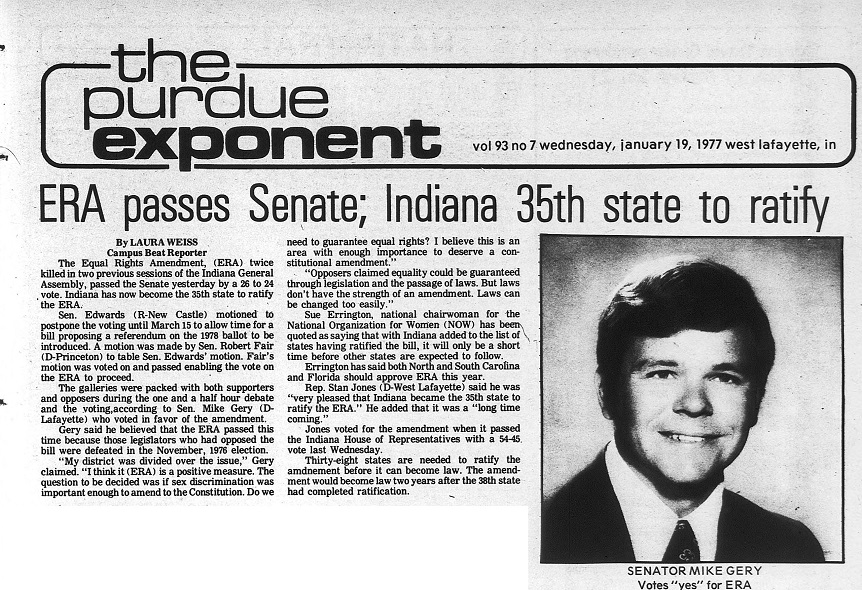
"ERA passes Senate; Indiana 35th state to ratify", January 19, 1977
Purdue Exponent Collection, volume 93, number 7
Description | Digital Image
Purdue Exponent Collection, volume 93, number 7
Description | Digital Image
An article from the Purdue Exponent announcing the ERA’s successful passage in the
Indiana Senate. On January 18, 1977, Indiana became the 35th and last state to ratify
the ERA before the deadline.
Indiana Senate. On January 18, 1977, Indiana became the 35th and last state to ratify
the ERA before the deadline.

Still Fighting for Equal Rights
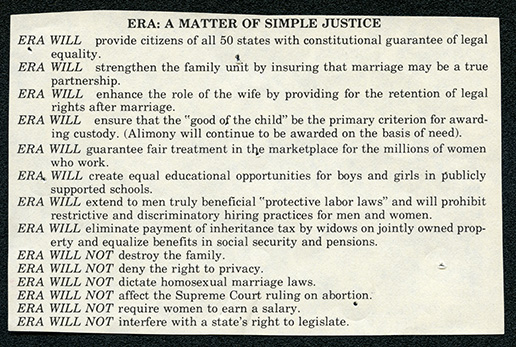
"ERA: A matter of simple justice", undated
Women's, Gender, and Sexuality Studies Program records, UA 63, Box 23, Folder 1
Description
Women's, Gender, and Sexuality Studies Program records, UA 63, Box 23, Folder 1
Description
A printed flyer explaining what the
Equal Rights Amendment will and will
not do in an attempt to dispel some of the myths and misinformation
circulating about the ERA.
not do in an attempt to dispel some of the myths and misinformation
circulating about the ERA.